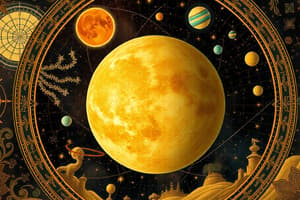Podcast
Questions and Answers
What is geocentrism?
What is geocentrism?
The belief that Earth is located at the center of a constant universe, with celestial objects revolving around it.
Who proposed the heliocentric model of the solar system?
Who proposed the heliocentric model of the solar system?
Nicolaus Copernicus and Galileo Galilei.
Which astronomer is known for discovering the redshift?
Which astronomer is known for discovering the redshift?
- Edwin Hubble
- William Huggins (correct)
- George Gamow
- Vesto Slipher
The steady-state theory proposes that the universe is expanding but does not account for its origin.
The steady-state theory proposes that the universe is expanding but does not account for its origin.
What is the big bang theory?
What is the big bang theory?
The universe is currently assumed to be about ___% dark energy, ___% dark matter, and ___% radiation.
The universe is currently assumed to be about ___% dark energy, ___% dark matter, and ___% radiation.
What did Father George Lemaitre propose about the universe?
What did Father George Lemaitre propose about the universe?
Flashcards are hidden until you start studying
Study Notes
Origin of the Universe
-
Early civilizations, including the Sumerians, Egyptians, and Greeks, developed intricate star charts and celestial models. These early astronomical endeavors were not merely scientific; they were deeply intertwined with the cultural narratives and myths that explained their existence and surroundings. For instance, constellations were often named after deities and legendary heroes, reflecting the societies' beliefs and values. This fusion of mythology with empirical observation allowed ancient peoples to interpret their environment and the universe, providing a framework for understanding natural phenomena. The night sky served not only as a canvas for their astronomical observations but as a vital narrative tool, giving meaning to their lives and influencing agricultural, navigational, and religious practices.
-
Additionally, ancient cultures placed significant emphasis on celestial events, such as eclipses and planetary conjunctions, which were often viewed through the lens of divine will or cosmic significance. The cyclical nature of the seasons, as dictated by the stars and constellations, was crucial for agricultural societies, leading to the establishment of calendars and rituals that honored the cycles of nature and the cosmos.
-
Various cultures, including Egyptians and Chinese, proposed chaotic interactions in the cosmos as the universe's origin. These ideas often included a pantheon of gods interacting in a primordial chaos, which eventually gave rise to the ordered cosmos as they understood it. For instance, in ancient Egyptian cosmology, the creation myth involved the god Atum emerging from the chaotic waters of Nun to create the world, while ancient Chinese philosophy presented concepts of yin and yang, embracing the balance of opposing forces shaping the universe.
Classification of Beliefs
- Theism: This belief system encompasses a wide variety of perspectives, all centered around the idea of a divine creator responsible for the universe's origins. Theistic frameworks vary significantly, including monotheism, polytheism, and pantheism, each providing different interpretations of the divine's relationship to the cosmos and its creation.
- Atheism: This viewpoint holds that there is no divine being responsible for the universe, positing instead a random origin of cosmic events. Atheists rely on scientific explanations for phenomena, often emphasizing the role of chance and natural processes in the formation of the universe, as opposed to any supernatural involvement.
Geocentrism
- Ancient Greek philosophers like Euxodus, Aristotle, and Ptolemy posited Earth as the universe's center in a geocentric model, a view that dominated for many centuries. This belief was largely based on apparent observations, such as the way celestial bodies seem to move across the sky, leading to the conclusion that Earth must be at the center of their motion. This Earth-centered model was also grounded in philosophical and theological beliefs that emphasized the special status of humanity and Earth.
- Celestial objects were seen as perfect spheres, moving uniformly in circular orbits around Earth. The underlying notion of perfection was derived from philosophical principles, with circular motion deemed the most harmonious and divine. Such ideas were so ingrained in Western thought that they persisted even in the face of contrary evidence for centuries, influencing not only scientific discourse but also religious teachings and worldviews.
Heliocentrism
- Galileo Galilei and Nicolaus Copernicus revolutionized astronomy by introducing the heliocentric model, which posited that planets orbit the Sun. This paradigm shift marked a significant departure from centuries of geocentric thought and faced considerable opposition, particularly from established religious authorities who felt threatened by the implications of a Sun-centered universe.
- Johannes Kepler contributed to heliocentric theories through his laws of planetary motion, which described the elliptical orbits of planets, providing a more accurate understanding of their movements. Kepler's work laid the groundwork for Newton's laws of gravitation and further established the heliocentric model's legitimacy, incorporating precise mathematical frameworks that further illuminated our understanding of celestial mechanics.
Route to the Big Bang
- Edwin Hubble: In the 20th century, Hubble demonstrated the universe's expansion through his observations of distant galaxies, indicating
Studying That Suits You
Use AI to generate personalized quizzes and flashcards to suit your learning preferences.




